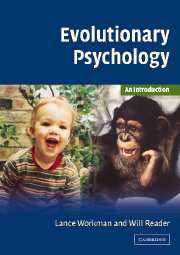Book contents
- Frontmatter
- Contents
- List of figures
- List of tables
- 1 Introduction to evolutionary psychology
- 2 Mechanisms of evolutionary change
- 3 Sexual selection
- 4 The evolution of human mate choice
- 5 Cognitive development and the innateness issue
- 6 Social development
- 7 The evolutionary psychology of social behaviour – kin relationships and conflict
- 8 The evolutionary psychology of social behaviour – reciprocity and group behaviour
- 9 Evolution, thought and cognition
- 10 The evolution of language
- 11 The evolution of emotion
- 12 Evolutionary psychopathology and Darwinian medicine
- 13 Evolutionary psychology and culture
- Glossary
- References
- Index
- References
3 - Sexual selection
- Frontmatter
- Contents
- List of figures
- List of tables
- 1 Introduction to evolutionary psychology
- 2 Mechanisms of evolutionary change
- 3 Sexual selection
- 4 The evolution of human mate choice
- 5 Cognitive development and the innateness issue
- 6 Social development
- 7 The evolutionary psychology of social behaviour – kin relationships and conflict
- 8 The evolutionary psychology of social behaviour – reciprocity and group behaviour
- 9 Evolution, thought and cognition
- 10 The evolution of language
- 11 The evolution of emotion
- 12 Evolutionary psychopathology and Darwinian medicine
- 13 Evolutionary psychology and culture
- Glossary
- References
- Index
- References
Summary
Key concepts sexual selection, female choice, parental investment, handicap hypothesis, parasite theory, Muller's ratchet, tangled bank, the Red Queen, arms race
Natural selection has become well accepted as the main mechanism of evolutionary change. Despite this acceptance, it is clear that it fails to explain why males and females of many species differ so much. In this chapter we consider the way that the behaviour of each sex might affect the behaviour of the other. This is the concept of sexual selection. We also consider why sex itself exists as a means of reproduction when so many species are able to do without it. Finally, we look at some examples from the animal kingdom of how the behaviour of each sex may be affected by sexual selection.
Darwin and sexual selection
During the writing of The Origin of Species Darwin realised that many animals had both physical and behavioural features which are very difficult to explain in terms of natural selection. Because they face the same ecological pressures, natural selection should drive the characteristics of males and females of a species in the same direction; and yet in many vertebrate species males are larger and more gaudy than their female counterparts. Furthermore, males generally engage in a greater degree of risk-taking behaviour. The elaborate feathers that make up a peacock's tail, for example, make him conspicuous to predators such as foxes and tigers and the piercing calls that he makes to attract females also inform predators of his whereabouts.
- Type
- Chapter
- Information
- Evolutionary PsychologyAn Introduction, pp. 58 - 80Publisher: Cambridge University PressPrint publication year: 2004



